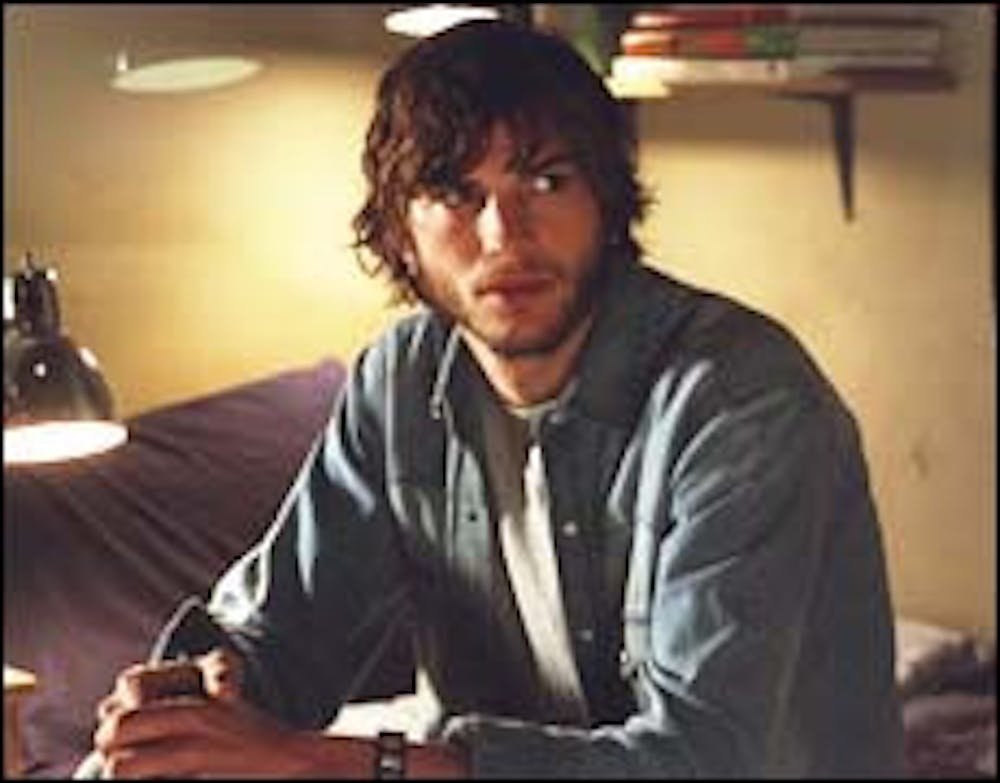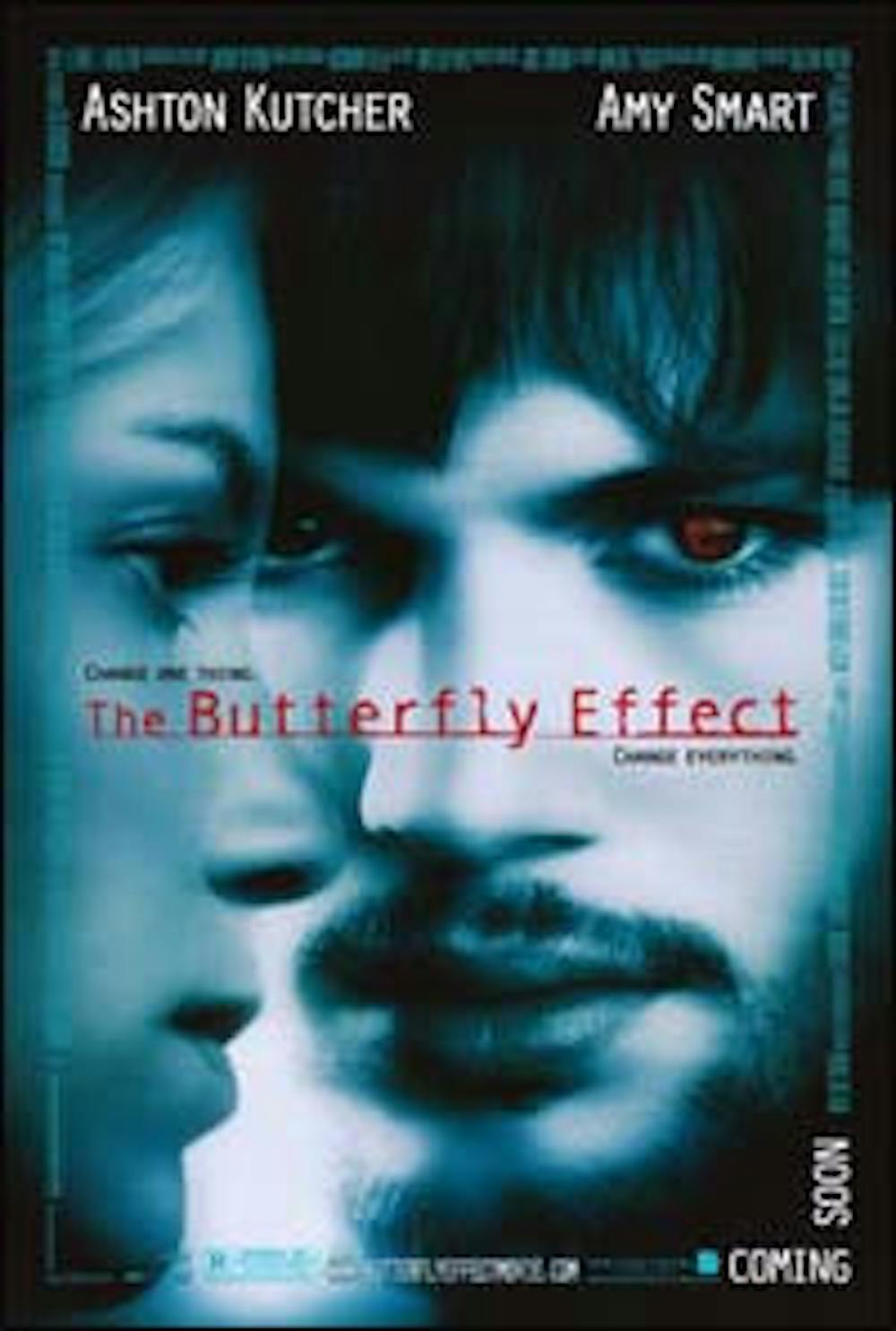If you could go back into your past and change one thing, what would it be? Everyone has some moment from their past that changed their lives forever. Everyone wonders what could be different if they said something else or made another choice. The question is: if we could change the past would we be prepared to deal with the consequences? Would we be ready to handle the chain of events set off by the simplest actions?
This thought has captured the imaginations of film makers for ages, and countless movies from Back to the Future to Time Machine have brought us depictions of how messy attempting to change the past can get.
The Butterfly Effect is the latest film that tries to address how events in the past of one person can be tied to our collective futures. The movie gets its title from a complicated question asked by the complex chaos theory: "Can the flap of a butterfly's wings in Brazil set off a tornado half way around the world?" A rather meaty question to answer - especially for a film starring Ashton Kutcher ("That '70s Show," Dude, Where's My Car?).
Surprisingly, Kutcher delivers a riveting performance as the troubled Evan Treborn. It is a role that required Kutcher to move beyond his usual character as the cutest dumb ass on the block. "Punk'd" fans will be happy to note he makes the transition rather well.
The film begins when Evan and his three best friends are children growing up in chaotic homes. Evan's father is institutionalized for some unexplained mental illness, and his two closest friends, brother and sister Tommy (William Lee Scott, Identity) and Kayleigh Miller (Amy Smart, Road Trip), live with an alcoholic father who is both sexually and physically abusive to them.
These three, troubled kids form a friendship, along with their sidekick Lenny (Elden Henson, Under the Tuscan Sun) that goes through a series of tragic events.

The Butterfly Effect
![]()
Starring Ashton Kutcher and Amy Smart. Directed by Eric Bress and J. Mackye Gruber.
Opens January 23 at all theatres.
We know early on that Evan is not like other kids. Things happen to him, disturbing things - life changing things. Afterwards he simply cannot remember what they are. He experiences several traumas throughout his early childhood and effectively blocks him from his memory. To help himself keep track of what goes on in his tumultuous young life, Evan starts keeping journals in hopes of jogging his memory. His journal-keeping proves ineffective until much later in the film when his memories start coming back to him all too well.
After Evan and his mother move away, the film flash forwards to his college years. After seven years of no blackouts or memory loss, Evan is doing extremely well at college and seems to have moved beyond the problems that troubled him as a child. Until one night when he returns home from a bar and starts reading through his old journals.
Suddenly, his old repressed memories start coming back to and hitting him hard. He soon discovers that while he is remembering what happened to him as a child he is able to go back to that moment and change the course of the event. It is not long until he decides that he must go back to the past and try to fix what happened to him and his friends as a child.
Of course, his attempt to mend the shattered lives of his childhood friends only ends in disaster. From this point on, the film takes us through a maze of the past and its ties to the future, demonstrating the ripple effect - that the slightest action and word can have an enormous impact on the lives of many people.
The child actors in the film are especially noteworthy and deliver superb performances in some of the most emotionally volatile scenes. In fact, one of the main reasons to see this film is to witness the excellent performance of the young Jesse James who plays the child-version of Tommy. Tommy is a complex, psychopathic character and James handles the role with the dexterity of a much older actor.
Unfortunately, the provocative performances by the child actors make it all too clear that the performances of their adult counterparts leave something to be desired. While Kutcher manages to make his character believable, there are times in the film where the viewer actually looks forward to yet another flashback if only to be impressed, once again, by the skill of the films young thespians. Like Kutcher, Smart also does a fair job with her character but again, leaves us wishing for a little more depth.
It is obvious that both actors took on their roles in this film to prove to the public that in addition to being hot, they can be serious. The problem is that often it is all too obvious how serious they are about being serious, and it can be a little hard to swallow. It is difficult to forget that this is a guy who has built a career on looking good and giggling, and a girl whose biggest claim to fame is wearing a whipped cream bikini in Varsity Blues.
Overall, the film is decent. It is most defiantly entertaining, though it does drag and become repetitive at times. The main flaw with The Butterfly Effect is it tries to come off as smarter than it is. Instead of attempting to be an artful look at the chaos theory in action, it should have focused more on what it really is - an entertaining couple of hours with an interesting story and some classic Hollywood eye candy.
Reach the reporter at megan.irwin@asu.edu.





